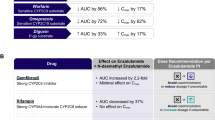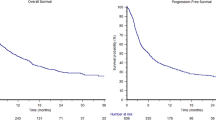Summary
Purpose To determine the dose-limiting toxicities (DLTs), maximum tolerated dose (MTD), safety, and pharmacokinetic and pharmacodynamic profiles of the tripeptide epoxyketone proteasome inhibitor oprozomib in patients with advanced refractory or recurrent solid tumors. Methods Patients received escalating once daily (QD) or split doses of oprozomib on days 1–5 of 14-day cycles (C). The split-dose arm was implemented and compared in fasted (C1) and fed (C2) states. Pharmacokinetic samples were collected during C1 and C2. Proteasome inhibition was evaluated in red blood cells and peripheral blood mononuclear cells. Results Forty-four patients (QD, n = 25; split dose, n = 19) were enrolled. The most common primary tumor types were non–small cell lung cancer (18 %) and colorectal cancer (16 %). In the 180-mg QD cohort, two patients experienced DLTs: grade 3 vomiting and dehydration; grade 3 hypophosphatemia (n = 1 each). In the split-dose group, three DLTs were observed (180-mg cohort: grade 3 hypophosphatemia; 210-mg cohort: grade 5 gastrointestinal hemorrhage and grade 3 hallucinations (n = 1 each). In the QD and split-dose groups, the MTD was 150 and 180 mg, respectively. Common adverse events (all grades) included nausea (91 %), vomiting (86 %), and diarrhea (61 %). Peak concentrations and total exposure of oprozomib generally increased with the increasing dose. Oprozomib induced dose-dependent proteasome inhibition. Best response was stable disease. Conclusions While generally low-grade, clinically relevant gastrointestinal toxicities occurred frequently with this oprozomib formulation. Despite dose-dependent increases in pharmacokinetics and pharmacodynamics, single-agent oprozomib had minimal antitumor activity in this patient population with advanced solid tumors.

Similar content being viewed by others
References
Glickman MH, Ciechanover A (2002) The ubiquitin-proteasome proteolytic pathway: destruction for the sake of construction. Physiol Rev 82:373–428
Adams J (2004) The development of proteasome inhibitors as anticancer drugs. Cancer Cell 5:417–421
Adams J (2004) The proteasome: a suitable antineoplastic target. Nat Rev Cancer 4:349–360
Richardson PG, Barlogie B, Berenson J, Singhal S, Jagannath S, Irwin D et al (2003) A phase 2 study of bortezomib in relapsed, refractory myeloma. N Engl J Med 348:2609–2617
Moreau P, Masszi T, Grzasko N, Bahlis NJ, Hansson M, Pour L, et al. (2015) Ixazomib, an Investigational Oral Proteasome Inhibitor (PI), in Combination with Lenalidomide and Dexamethasone (IRd), Significantly Extends Progression-Free Survival (PFS) for Patients (Pts) with Relapsed and/or Refractory Multiple Myeloma (RRMM): The Phase 3 Tourmaline-MM1 Study (NCT01564537). American Society of Hematology Annual Meeting; Orlando, FL; December 5–8. Abstract 727
Siegel DS, Martin T, Wang M, Vij R, Jakubowiak AJ, Lonial S et al (2012) A phase 2 study of single-agent carfilzomib (PX-171-003-A1) in patients with relapsed and refractory multiple myeloma. Blood 120:2817–2825
Engel RH, Brown JA, Von Roenn JH, O’Regan RM, Bergan R, Badve S et al (2007) A phase II study of single agent bortezomib in patients with metastatic breast cancer: a single institution experience. Cancer Invest 25:733–737
Papadopoulos KP, Burris HA III, Gordon M, Lee P, Sausvlle EA, Rosen PJ et al (2013) A phase I/II study of carfilzomib 2-10-min infusion in patients with advanced solid tumors. Cancer Chemother Pharmacol 72:861–868
Rosenberg JE, Halabi S, Sanford BL, Himelstein AL, Atkins JN, Hohl RJ et al (2008) Phase II study of bortezomib in patients with previously treated advanced urothelial tract transitional cell carcinoma: CALGB 90207. Ann Oncol 19:946–950
Shah MA, Power DG, Kindler HL, Holen KD, Kemeny MM, Ilson DH et al (2011) A multicenter, phase II study of bortezomib (PS-341) in patients with unresectable or metastatic gastric and gastroesophageal junction adenocarcinoma. Invest New Drugs 29:1475–1481
Smith DC, Kalebic T, Infante JR, Siu LL, Sullivan D, Vlahovic G et al (2015) Phase 1 study of ixazomib, an investigational proteasome inhibitor, in advanced non-hematologic malignancies. Invest New Drugs 33:652–663
Zhou HJ, Aujay MA, Bennett MK, Dajee M, Demo SD, Fang Y et al (2009) Design and synthesis of an orally bioavailable and selective peptide epoxyketone proteasome inhibitor (PR-047). J Med Chem 52:3028–3038
Hurchla MA, Garcia-Gomez A, Hornick MC, Ocio EM, Li A, Blanco JF et al (2013) The epoxyketone-based proteasome inhibitors carfilzomib and orally bioavailable oprozomib have anti-resorptive and bone-anabolic activity in addition to anti-myeloma effects. Leukemia 27:430–440
Roccaro AM, Sacco A, Aujay M, No HT, Azab AK, Azab F et al (2010) Selective inhibition of chymotrypsin-like activity of the immunoproteasome and constitutive proteasome in Waldenstrom macroglobulinemia. Blood 115:4051–4060
Chauhan D, Singh AV, Aujay M, Kirk CJ, Bandi M, Ciccarelli B et al (2010) A novel orally active proteasome inhibitor ONX 0912 triggers in vitro and in vivo cytotoxicity in multiple myeloma. Blood 116:4906–4915
Zang Y, Thomas SM, Chan ET, Kirk CJ, Freilino ML, DeLancey HM et al (2012) The next generation proteasome inhibitors carfilzomib and oprozomib activate prosurvival autophagy via induction of the unfolded protein response and ATF4. Autophagy 8:1873–1874
Therasse P, Arbuck SG, Eisenhauer EA, Wanders J, Kaplan RS, Rubenstein L et al (2000) New guidelines to evaluate the response to treatment in solid tumors. European organization for research and treatment of cancer, national cancer institute of the United States, national cancer institute of Canada. J Natl Cancer Inst 92:205–216
U.S. Department of Health and Human Services. Common Terminology Criteria for Adverse Events, version 4.02 (2009) In: [Internet]. Bethesda, MD: U.S. Department of Health and Human Services. 2013 [cited 2013 June 2]. Available from: http://evs.nci.nih.gov/ftp1/CTCAE/Archive/CTCAE_4.02_2009-09-15_QuickReference_8.5x11.pdf
Acknowledgments
The authors thank all of the patients and their families and caregivers who contributed to this study; the investigators and staff from the additional participating study sites; all of the participating research nurses and data coordinators; Darrin Bomba and Tina Woo (Onyx Pharmaceuticals, Inc.) for clinical operations support; Sandra Dixon (Onyx Pharmaceuticals, Inc.) for statistical support; Ying Ou (Onyx Pharmaceuticals, Inc.) for her assistance analyzing the pharmacokinetic data; and Janet Anderl (Onyx Pharmaceuticals, Inc.) for her assistance running and analyzing the pharmacodynamic assays. This work was supported by Onyx Pharmaceuticals, Inc., an Amgen subsidiary. Editorial assistance was provided by BlueMomentum, a division of KnowledgePoint360 Group and funded by Onyx Pharmaceuticals, Inc., an Amgen subsidiary.
Author information
Authors and Affiliations
Corresponding author
Ethics declarations
Conflicts of interest
Jeffrey R. Infante, David S. Mendelson, Howard A. Burris III, Johanna C. Bendell, Michael S. Gordon, and KPP have no relevant conflicts of interest to disclose. Anthony W. Tolcher has received research funding from GSK. Heidi H. Gillenwater, Shirin Arastu-Kapur, and Hansen L. Wong are employed by Onyx.
Ethical statement
All procedures performed in studies involving human participants were in accordance with the ethical standards of the institutional and/or national research committee and with the 1964 Helsinki declaration and its later amendments or comparable ethical standards.
Financial support
Onyx Pharmaceuticals, Inc., an Amgen subsidiary, South San Francisco, California.
Electronic supplementary material
Below is the link to the electronic supplementary material.
ESM 1
(DOCX 130 kb)
Rights and permissions
About this article
Cite this article
Infante, J.R., Mendelson, D.S., Burris, H.A. et al. A first-in-human dose-escalation study of the oral proteasome inhibitor oprozomib in patients with advanced solid tumors. Invest New Drugs 34, 216–224 (2016). https://doi.org/10.1007/s10637-016-0327-x
Received:
Accepted:
Published:
Issue Date:
DOI: https://doi.org/10.1007/s10637-016-0327-x




